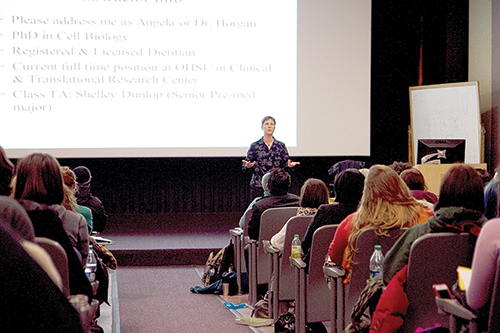Most students think of health as an easy class, but Angela Horgan’s nutrition class is something different. Starting off by discussing the science of nutrition, Horgan emphasizes that the class is a rigorous science class.
Teacher aims to make nutrition enjoyable despite hard science
 Angela Horgan lectures her nutrition class. The course focuses on macronutrients. Photo by Kayla Nguyen.
Angela Horgan lectures her nutrition class. The course focuses on macronutrients. Photo by Kayla Nguyen.
Most students think of health as an easy class, but Angela Horgan’s nutrition class is something different.
Starting off by discussing the science of nutrition, Horgan emphasizes that the class is a rigorous science class.
That said, Horgan does her best to make it enjoyable.
“I try to make it at least interesting enough for some of the senior students, but not too hard so that the younger students aren’t going to do poorly,” Horgan said.
Horgan explained that in the class, students learn about diet and the calories of the different macronutrients; digestion and the organs involved; carbohydrates; lipids, which includes fats; protein; metabolism and how we use those macronutrients to make energy; alcohol and its related issues; weight and energy balance and the components that go into burning energy; and different aspects of vitamins and minerals.
In 10 weeks only so much can be covered, but Horgan feels she touches on all the basics.
“[T]his gives people the fundamentals, and then they’re able to understand better the research that’s coming out,” she said.
Horgan believes that a healthy diet contains a good balance of the macronutrients, vitamins and minerals. She said that with these different diets like gluten-free and low-carb, people aren’t really understanding what a healthy diet is.
“I try to dispel those fads and just say these are the fundamentals that we know about, and you can make decisions about what things you want to eat,” Horgan said.
The class is split into two parts: online and in-class. The class meets in person once a week for two hours to discuss the more controversial topics. The online portion contains taped lectures and PowerPoint presentations that students are free to peruse at their own pace.
Horgan also provides an online discussion section for personal opinions and questions about specific diets that aren’t addressed during class.
An important part of the class is the three-day diet analysis. Students are asked to keep track of everything they eat over a three-day period, and then they look at how many vitamins, minerals, carbohydrates, proteins and fats they are getting and compare those numbers to the suggested amounts.
“I think it’s really valuable, because most people don’t realize that websites like MyPyramid have suggestions based off of specific things your body needs,” Horgan said. “So when students see the numbers, that allows them then to say, ‘these are the foods I need to eat to get higher amounts of specific things I need.’”






